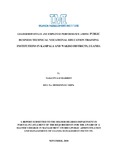Leadership-styles and employee performance among public business technical vocational education training institution in Kampala and Wakiso district, Uganda
Abstract
The study examined the effect of leadership styles on employee performance in public BTVET
institutions in Kampala and Wakiso districts. It was guided by the following objectives:- 1) To
find out how authoritarian leadership style affects employee performance. 2) To establish the
effect of democratic leadership style on employee performance. 3) To establish the moderator
effect of Government policy on the relationship between leadership styles and employee
performance in public Business, Technical Vocational Education and Training (BTVET)
institutions in Kampala and Wakiso districts. Data was collected using self administered
questionnaires which included both open-ended and close-ended questions. The category of
Principals had closed ended questionnaires and interviews. Qualitative and quantitative methods
were used in the study. Quantitative data was analyzed using statistical package for social
scientists (SPSS) software while qualitative data was analyzed using a thematic approach. The
results from 130 respondents indicated that authoritarian leadership style had a negative effect on
employee performance compared to democratic leadership style which had a positive statistically
significant effect. It was also found that government policy had a positive moderator effect on
the relationship between leadership style and employee performance. It was concluded that 1)
principals more commonly use a mixture of the two leadership styles. 2) That authoritarian
leadership style had a negative non significant effect on employee performance. 3) That
democratic leadership style had a significant positive effect on employee performance and that 4)
Government policy positively moderated the relationship between leadership style and employee
performance. The researcher recommended that employees be involved in decision making and
individual goals be aligned with institutional goals; principals should improve employee
empowerment and come up with motivational systems within institutional structures. The
researcher highlighted staffing levels, inner motivation, self efficacy and levels of education as
areas for further research in regard to employee performance.

